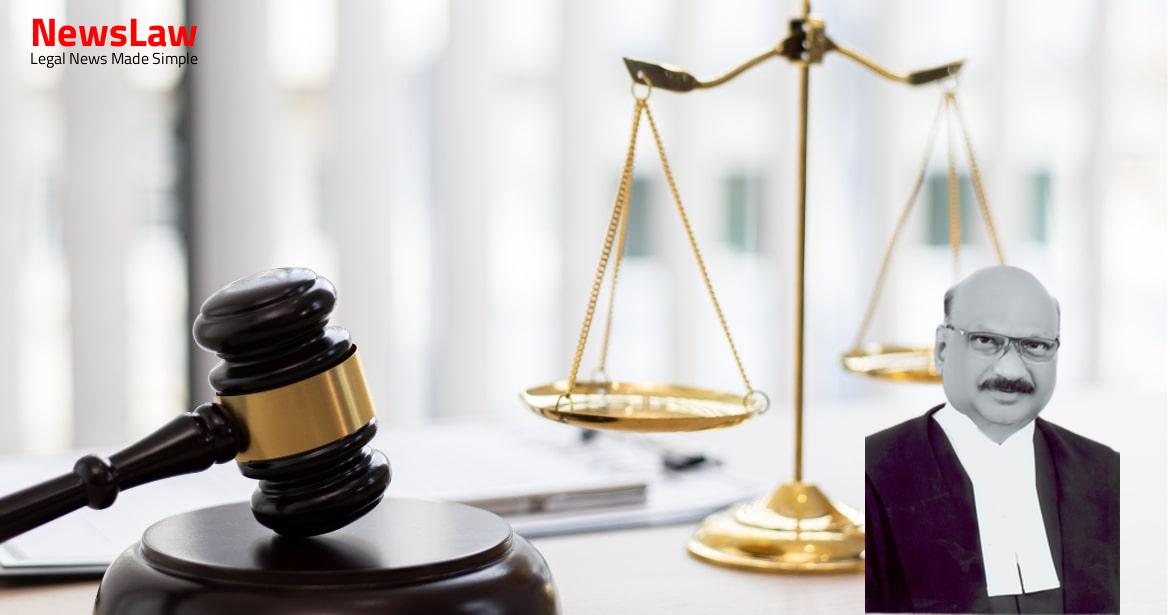In a significant legal case involving opium possession, the Supreme Court of India delivered a judgment upholding the conviction and sentence of the accused. The case, pertaining to violations under the NDPS Act, witnessed detailed analysis by the courts at various levels. The High Court’s decision to affirm the conviction and sentence imposed by the Special Judge was pivotal in this case. The appellant’s appeal against the ruling was dismissed, with the courts emphasizing the adherence to the provisions of law and the evidence on record.
Facts
- Accused was apprehended by the police party carrying a bag with opium
- Bag was searched in the presence of ASP resulting in recovery of 1 kg 750 grams of opium
- No evidence was led by the accused in defense
- Samples of opium were sealed and taken into possession
- Accused convicted under Section 18 of NDPS Act and sentenced to 10 years of rigorous imprisonment
- Four prosecution witnesses testified against the accused
- Accused’s statement under Section 313 of Cr.P.C. was recorded
- Accused filed a criminal appeal before the High Court of Punjab and Haryana
- The learned Special Judge, Ferozepur, after analyzing oral and documentary evidence, found the appellant guilty of keeping 1 kg 750 grams of opium in the village Dalmir Khera.
- The appellant was convicted under Section 18 of the Act and sentenced to 10 years of rigorous imprisonment along with a fine of Rs.1,00,000.
- In case of default in paying the fine, the appellant would undergo rigorous imprisonment for one year.
- The High Court, through its judgment dated 22.04.2008, upheld the conviction and sentence imposed by the Special Judge in the appeal filed by the appellant.
Also Read: Interpretation of Will Clauses in Property Dispute
Arguments
- Trial Court and High Court committed error in convicting the appellant.
- Reliance placed on judgments of Trimukh Maroti Kirkan v. State of Maharashtra, Noor Aga v. State of Punjab & Anr, and Mohan Lal v. State of Punjab.
- Argument made that independent witnesses in the patrolling party were not examined, leading to an incomplete conviction.
- Counsel cited the judgment in Mohan Lal indicating that informant and investigator cannot be the same person.
- ASI who received the case property was not examined, creating a link evidence gap in violation of Section 50 of NDPS Act, 1985.
- Argument presented based on official witnesses and absence of S.K. Asthana, ASP during the opium recovery.
- Prosecution claimed to have provided cogent evidence proving guilt beyond reasonable doubt, opposing interference with the conviction.
- Learned counsel argued that the absence of independent witnesses does not prove false implication.
- Counsel cited the case of Jarnail Singh v. State of Punjab and Varinder Kumar v. State of Himachal Pradesh in support.
- The non-examination of ASI Joginder Singh, to whom the case property was handed over by SHO Yogi Raj, was highlighted as incomplete link evidence.
- Relying on Jarnail Singh v. State of Punjab, it was emphasized that lack of independent witnesses does not necessarily mean false implication.
- The prosecution’s reliance on official witnesses was not a reason to doubt the case.
- The involvement of Joginder Singh, ASI, in the case property handover was a significant aspect that was not properly addressed.
Also Read: Preservation of Open Spaces in Development Plans
Analysis
- The non-examination of ASP was contended to be fatal to the prosecution’s case and a violation of Section 50 of the NDPS Act.
- Evidence on record shows ASP was summoned at the time of search and seizure, and search was conducted in his presence, thus no violation of Section 50.
- ASP’s absence was justified by reasons each time he did not appear, indicating no deliberate avoidance.
- High Court directed Trial Court to decide the case before a set date.
- Presumption in law favors the regularity of official acts by police officers.
- The non-examination of Joginder Singh did not impact the prosecution’s case according to both Trial Court and High Court.
- Chemical Examiner’s report confirmed the integrity of the sample seals, completing the chain of evidence.
- In the case of Varinder Kumar, it was held that pending criminal prosecutions, trials, and appeals prior to the law laid down in Mohan Lal should continue to be governed by individual facts of the case.
- In the case of State, Govt. of NCT of Delhi v. Sunil & Anr., it was stated that actions of the Police Officer should not be approached with initial distrust as an archaic notion.
- The prosecution has proven the guilt of the appellant beyond reasonable doubt.
- The conviction and sentence are in line with the provisions of law and evidence on record.
- No interference is necessary as the conviction and sentence are justified.
- The appeal lacks merit and is therefore dismissed.
- The findings of the Trial Court and High Court are supported by the oral and documentary evidence on record.
Also Read: Star India vs. Airtel: Unfair Trade Practices Case
Decision
- Appellant-accused is on bail but bail bonds are cancelled.
- The appellant is directed to surrender within four weeks to serve the remaining sentence.
- If the appellant fails to surrender, the Chief Judicial Magistrate will take steps to arrest the appellant to serve the remaining sentence.
Case Title: SURINDER KUMAR Vs. THE STATE OF PUNJAB (2020 INSC 1)
Case Number: Crl.A. No.-000512-000512 / 2009



